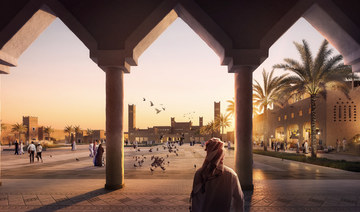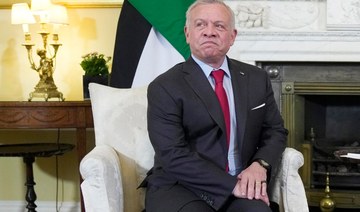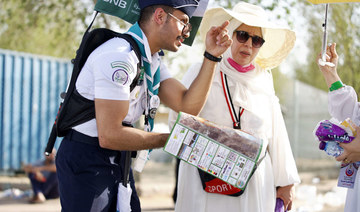RIYADH: In honor of the 92nd Saudi National Day, Naila Art Gallery has put together the exhibition “Saudi Crafts,” bringing 30 studios, artists and artisanal brands to showcase their creative ventures from Sept. 20-30.
Among prominent names in the Saudi art scene, such as Abdullah Hammas and Najla Al-Saleem, is May Hamdan, whose artworks merge traditional aspects and techniques with contemporary ones in her first exhibition. She has titled her work “Mader,” which is a combination of the two Arabic words for “past” and “present.”
For her growing series, currently featuring only two artworks, the artist makes use of the Kingdom’s traditional Sadu weaving technique alongside her signature contemporary, crystal-like resin elements.

Saudi Scenes is an artwork and souvenir shop, offering a wide range of creations that are perfect for a special gift from home. From artwork collections to handmade pottery and jewelry, the shop proudly showcases its heritage.
Rashed Al-Debas is another artist incorporating resin along with string art in his work to create powerful portraits, claiming the work is the first of its kind globally. One of his portraits is a heartfelt tribute to Crown Prince Mohammed bin Salman and the late King Abdulaziz, reflecting the changes Saudi Arabia is experiencing now in contrast with the emerging nation it was nine decades ago.
“I chose this idea because we all see the crown prince as another version of King Abdulaziz in his qualities, determination, statesmanship and values. His character is a byproduct of his grandfather,” Al-Debas told Arab News.
HIGHLIGHT
Among prominent names in the Saudi art scene, such as Abdullah Hammas and Najla Al-Saleem, is May Hamdan, whose artworks merge traditional aspects and techniques with contemporary ones in her first exhibition. She has titled her work ‘Mader,’ which is a combination of the two Arabic words for ‘past’ and ‘present.’
While the execution took three to four hours a day for four weeks, it was worth it for the emerging artist to represent the country’s growth and express his patriotism.

Saudi Scenes is an artwork and souvenir shop, offering a wide range of creations that are perfect for a special gift from home. From artwork collections to handmade pottery and jewelry, the shop proudly showcases its heritage.
“National Day is an event cherished by every Saudi citizen and resident,” he said, reminiscing on how far the Kingdom has come over the years.
Artist Muneerah Al-Ogla’s work, meanwhile, is an homage to the Saudi woman. Bursting with shades of blue and green and featuring a young girl set against spiral shapes, with doves and palm trees looming above, the painting “symbolizes the things going on in a Saudi woman’s life,” said Al-Ogla.
“Regardless of what is happening in her life, she’s able to hold her head up and move past the struggles and set goals for herself,” the artist told Arab News.
In the two-piece oil painting, the dove symbolizes inner peace, Al-Ogla explained, signifying the subject’s ability to balance the difficulties of her past and reimagine a life for herself within the borders of the Kingdom.

Saudi Scenes is an artwork and souvenir shop, offering a wide range of creations that are perfect for a special gift from home. From artwork collections to handmade pottery and jewelry, the shop proudly showcases its heritage.
“This is our time as creatives in Saudi because the whole community now understands the importance of art. Now is the time for us to really deliver our creativity, as it takes on a role in reflecting the Kingdom’s image abroad, not just locally,” Al-Ogla said.
Catching the eye of visitors and fellow artists alike is Hams Muryh’s work, which aspires to document traditional Southern crafts. She incorporates Al-Haseer, a traditional hand-weaving technique using date palm leaves, and Al-Qatt Al-Asiri, a style of Saudi art that is usually painted by women in the southern region of the Kingdom.
“They are symbols of our southern authenticity. This is the culture we inherited,” Muryh told Arab News, explaining how she combined and tried to balance the different techniques to modern effect.
“Saudi Crafts” also brought together a number of local collective craft studios and designers, such as Desert Designs, Herfa Association, Sadu Tarha, Wuhah Studio and others.
Keramos Studio is a Saudi brand established by Morouj Al-Shatri that aims to revive the ancient craft of pottery-making in the region, inspired by elements of Islamic art, Saudi folklore and local heritage.
While both the brand name and clay are imported from European countries, Greece and Italy respectively, all the products are designed and made by Saudis using traditional Saudi styles such as Sadu, Al-Qatt, and Hijazi Rawashin.
Along with its products, the company also offers workshops in which it teaches the techniques behind its crafts all year round.
Saudi Scenes is an artwork and souvenir shop, offering a wide range of creations that are perfect for a special gift from home. From artwork collections to handmade pottery and jewelry, the shop proudly showcases its heritage.
In this particular exhibition, its articles of choice were hand-painted local and traditional imagery on Daf, a Middle Eastern frame drum made from authentic leather. The featured scenes are interpretations of traditional Saudi desert settings, such as tent celebrations, horse riding and the historic Diriyah wall.
“I transformed the Daf from a musical instrument into an art piece, adding an element of light from the back to showcase the details more beautifully on the canvas. In the daylight, it’s the original painting, and dim light during the night may give off different aesthetics,” featured artist Duaa Al-Badr said about the work.





























